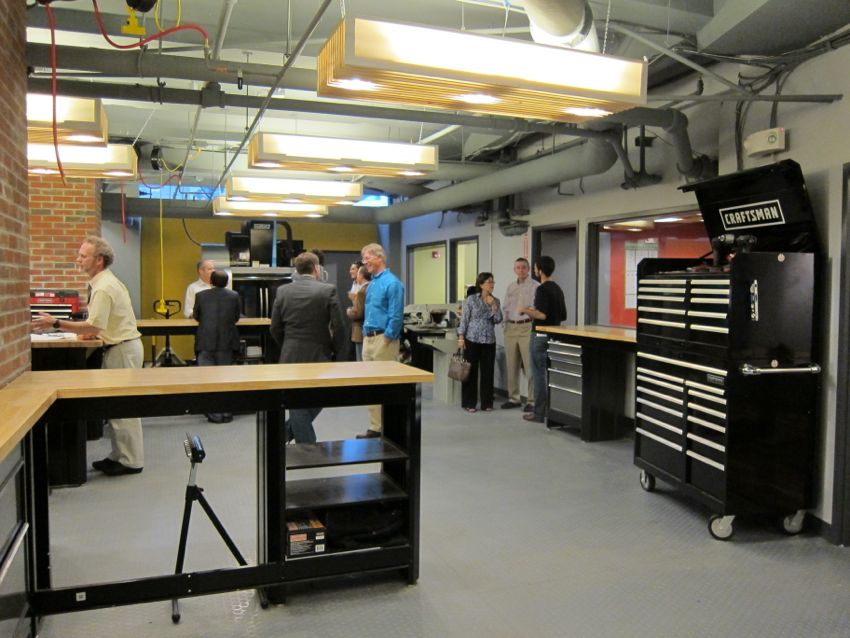Boston Gets Its First Hardware Startup Accelerator

Photo by Janelle Nanos
“This the room of cool shit,” Ben Einstein said as he provided a tour through Bolt, the new startup accelerator which opened Thursday night in Downtown Crossing. Einstein, decked out in a rumpled T-shirt and a mess of unruly curls, pointed out the $50,000 3D printer they had on site, then showed off the smaller, more delicate Formlabs model also on hand. “This is what’s awesome. This is like from Star Trek,” he said, fiddling with a piece of plastic they’d recently printed in the shape of Bolt’s logo. And that was just one room in the tricked-out basement of 110 Chauncey Street. The 10,000-square-foot home of Boston’s first startup accelerator for physical objects is like a high school shop class on steroids: packed with drill presses, milling machines, band saws, and other equipment all aimed to help manufacturing startups prototype their new designs.
Bolt was Einstein’s idea, and he serves as the managing director of the new space, which he launched with the help of Axel Bichara, who brings management experience from having worked at Atlas Ventures, and Scott Miller, who helps manufacturing startups get off the ground as the CEO of Dragon Innovation. The threesome envisioned a space where they could provide the same support and guidance to hardware companies that software startups get through accelerators like TechStars, and together raised more than $3.5 million to open Bolt. “I always say, ‘Hardware is hard,'” Miller explained. Prototyping new devices is often challenging enough for developers, he noted, so getting them to the point where they can be manufactured on a large scale takes time and oversight (that’s where he comes in). Part of the aim is to enable designers and developers to avoid the pitfalls of Kickstarter, where crowd-sourced manufacturing is often stymied once the creator has to actually go about getting their products made (see: the lost lock pick). Bolt’s aim isn’t just to launch cool one-off projects, says Einstein, “It’s a better way to help young companies build stuff.”
Here’s how it works: Staring in March, developers could apply for a spot at Bolt, which in turn would provide them $50,000 in seed money and a six-month training program at the space. Over 850 applicants applied for 10 spots, and the Bolt team is still winnowing down the finalists. Those winners exchange a percent of the equity in their company for the chance to take part in the program, a move that has everyone invested in a company’s success, Einstein says. While he’s a bit cagey about what exactly they’ll be making, he says most of the applicants are working on “connected devices,” like internet-linked apps and tools.
At the opening, the place was packed with investors and others checking out all the cool shit, and it garnered the attention of Governor Deval Patrick, who showed up to help kick off Bolt’s launch. “We are so excited to have you here and for what you’re doing,” Patrick said. “And to those of you who helped built out [the space], most of whom bathed before the event.”
“Sorry,” Einstein said sheepishly, as he’d been moving furniture—most of which he and his team built themselves—into the space just up until the guests arrived.
“This is really important,” Patrick continued, “We have a strategy on building our economy in the Commonwealth based on education, innovation and infrastructure … As you develop your ideas and are ready to commercialize, make it in Massachusetts.”
In a way, Bolt brings new meaning to the old saying, “If you build it, they will come.”

